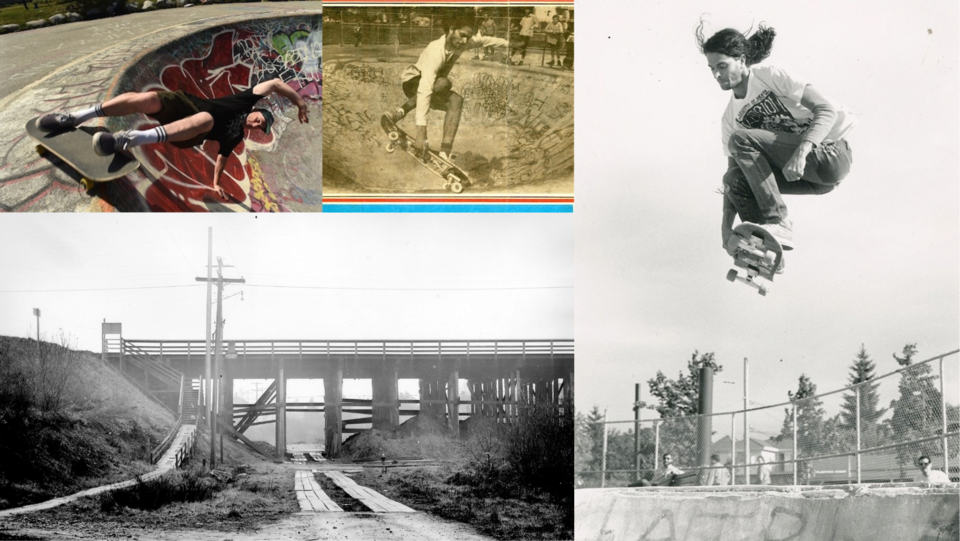This weekend a spot some would consider an unlikely candidate is getting a heritage plaque.
The China Creek skatepark, made up of two bowls of concrete, is being recognized for its role in the city's skateboarding culture. Built in 1979, it's been around for more than 40 years; that's a feat given the sport didn't really take off until the 70s.
As one of the more obscure historical locations in Vancouver there's a good chance you may not know much about the curvy concrete above China Creek, and so here are a few new facts (probably).
1. It was built above a creek and an (impromptu) dump
Perhaps the name China Creek skateboard park gives it away, but the bowls are built above a creek basin.
And it's not like that name is just for a nearby feature. China Creek's historical route appears to be directly beneath the double bowls as it runs from Trout Lake to the (historical) edge of False Creek.
In the early days of the city, particularly the 20s and 30s, the area was used as a sort of garbage dump. The creek had created a wide ravine, at points 200 feet wide and 40 feet deep (it was the last section of the largest drainage basin in Vancouver).
Give people a free, easy place to dump things in a city, and they'll take it, whether it's permitted or not.
In 1951 the city put the creek through a pipe and revitalized the area; the China Creek parks were founded without any creek within sight.
More recently, there have been people interested in uncovering and 'daylighting' the creek.
2. It's not the oldest skatepark in Vancouver
Opened in the summer of 1979, China Creek skate park is widely thought of as the third skatepark in Canada and the first in the City of Vancouver, following a couple of others in Metro Vancouver.
However, local historian Michael Gordon notes it was beat by a year by the Prince Edward Park bowl, which the parks board built in 1978.
Which is still (sort of) there.
The little bowl can be seen, partially buried, in the park just off Main Street at East 22 and Sophia. It's buried in sand and playground equipment. Gordon isn't sure when it was buried but notes it was likely due to noise complaints (a common issue with skate parks).
According to longtime local skateboarders, no one remembers it, despite the fact it's physically there, and there's paperwork to back it up.
3. It fell apart right away
Nelson Holland, who had designed the other Metro Vancouver skate parks, designed the bowls with the help of local kids, and they came up with a grand plan.
However, when they started building it they found the soil was not good (remember how it was filled in over a creek?).
This meant it had to be reconfigured so the concrete wouldn't crack as the soil below shifted. The original design had one pool area, a half-pipe and some free area (in all costing about $32,000); at the time street skating wasn't a thing, so rails for grinding and things like that weren't considered.
The smaller design (the bathtub and the teacup) were built and set to be opened in August of 1979.
“There were people who came at nighttime after the top coat went on that were skating it, but the concrete didn’t marry properly to the surface,” Monty Little told the Vancouver Courier in 2019. “It’s opening day, people from the city are there and it’s falling apart. Not the best PR. It was devastating.”
The park had to be shut down for several weeks while it was re-coated.
4. There have been annual competitions held by the Jaks since the 80s
The Jaks is a "hardcore skateboard team" that was founded in the early 80s, according to iconic Vancouver skate brand Skull. And they aren't just active in Vancouver; you'll find Jaks Skateteam all over the place.
"The team is a blend of old school skaters, hardcore punkers and crazy f***ers that skate," they say on their website, which is also filled with Vancouver skater histroy.
Around 1985, with the China Creek skate park well established and the only park of its kind in the city, they decided to hold competitions, arguably the oldest regular competitions in Canada.
The last one appears to have been in September 2019, just before the pandemic put events like it on hold.
5. In 2006 the city almost decided to destroy it
In 2006 some people with the city thought it was time to give China Creek South Park an upgrade.
Parks board staff came up with three options; one would keep the skate park in that location, one would see it moved, and one would see it broken up and new one built in a yet-to-be-determined place.
Residents of the neighbourhood heavily supported the last one.
"Option 3 is supported by the majority of residents living very close to the park, and by some residents who live in the neighbourhood but not adjacent to the park," staff noted in a report. "Option 3 is not supported by the skateboarders."
Before the commissioners made their decision a delegation of skateboarders attended a meeting to argue for their cause. Luckily for the skaters, the parks board decided it should stay in place (though some rails were removed because of noise).




